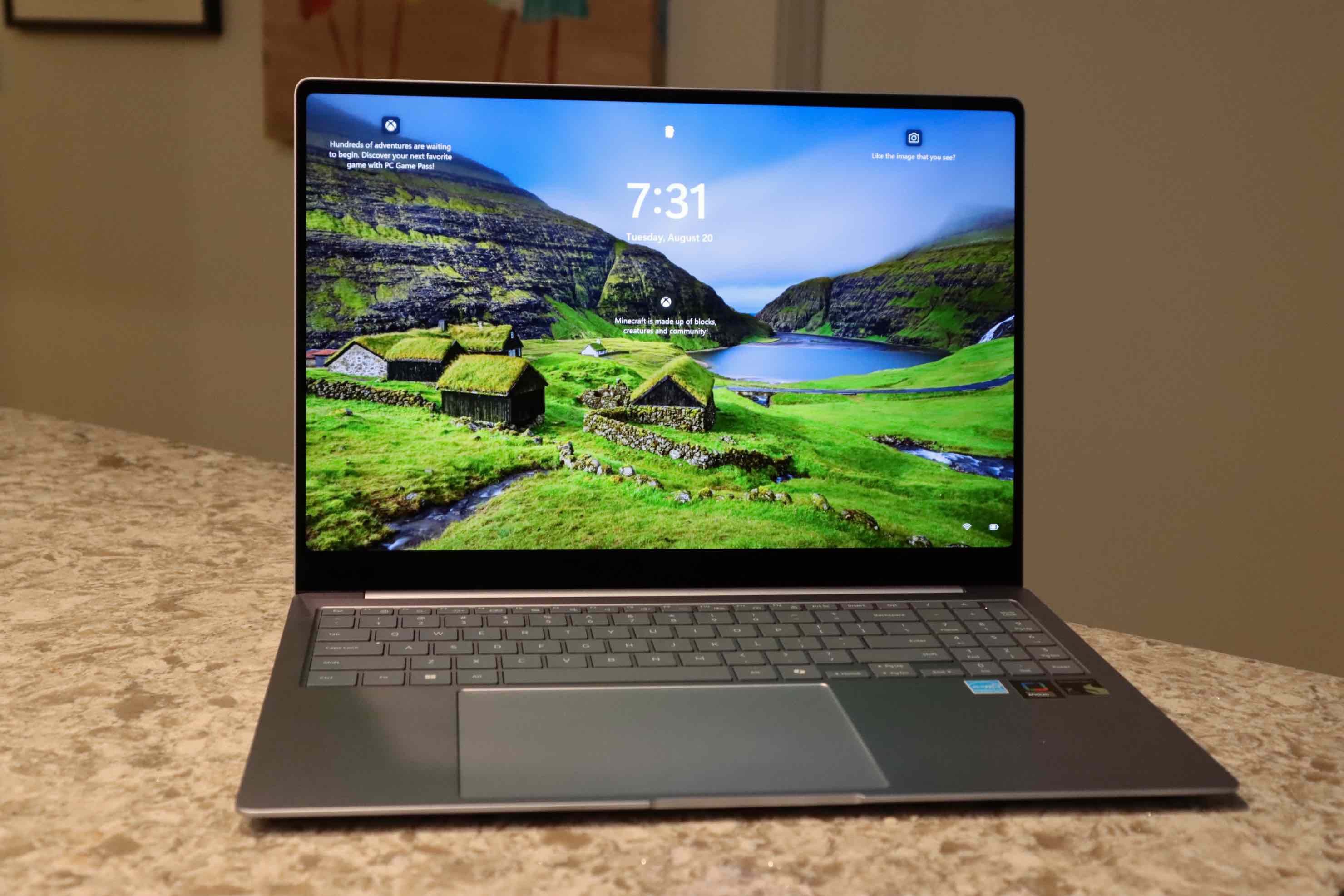
Samsung Galaxy Book4 Edge: Two-minute review
As Samsung's first Windows 11 Copilot+ PC, the Galaxy Book4 Edge has a lot going for it, including momentum in the space with more applications rolling out support. Still, though, the Book4 Edge has some pretty tough competition - some of which has the laptop beat in terms of design and battery life.
The Galaxy Book4 Edge impressed with its lightweight and thin build for the more prominent 16-inch size that we tested. The star, though, alongside plenty of ports, was the vibrant and immersive AMOLED display, which was great for word processing, image editing, building stories, and editing images – as well as for watching movies and TV shows or the occasional video call.
Performance, as we've come to expect from the Qualcomm Snapdragon X Elite, was very impressive and made any task, aside from gaming, run smoothly. It also fixed the problem of a long wait to wake the laptop up from sleep. However, the Book4 Edge lacks overall battery life, so if you need a road warrior, you'd be better served by a Dell XPS 13 or Surface Laptop 7.
Even so, if you're after a big screen, the Galaxy Book4 Edge offers fast performance and deep integration with Samsung Galaxy phones and tablets, which other Copilot laptops cannot match. It's also heavily discounted, making the 14-inch or 16-inch models much more affordable.
Samsung Galaxy Book4 Edge: Price & availability
- How much does it cost? $1,349.99 / £1,399 starting for the 14-inch or $1,449.99 / £1,499 starting for the 16-inch
- When is it available? Available now
- Where is it available? Available in the US and UK
Samsung's Galaxy Book4 Edge is currently available directly from the technology giant and authorized resellers like Best Buy in either a 14-inch or a 16-inch size. Know that if you want 1TB of storage or the faster 3.8GHz Snapdragon X Elite processor, you'll need the 16-inch size.
The 14-inch with 512GB of storage, 16GB of RAM, and the 3.4GHz Qualcomm Snapdragon Elite starts at $1,349.99 / £1,399, while the 16-inch with the same specs starts at $1,449.99 / £1,499. You'll need to pay more for the 3.8GHz processor and 1TB of storage at $1,749.99 or £1,699. For either model, though, Samsung is offering some substantial discounts.
It is also worth considering the Surface Laptop 7 since the 13-inch and 15-inch models are cheaper and have similar specs.
Samsung Galaxy Book4 Edge: Specs
- Specs: 4 / 5
Samsung Galaxy Book4 Edge: Design
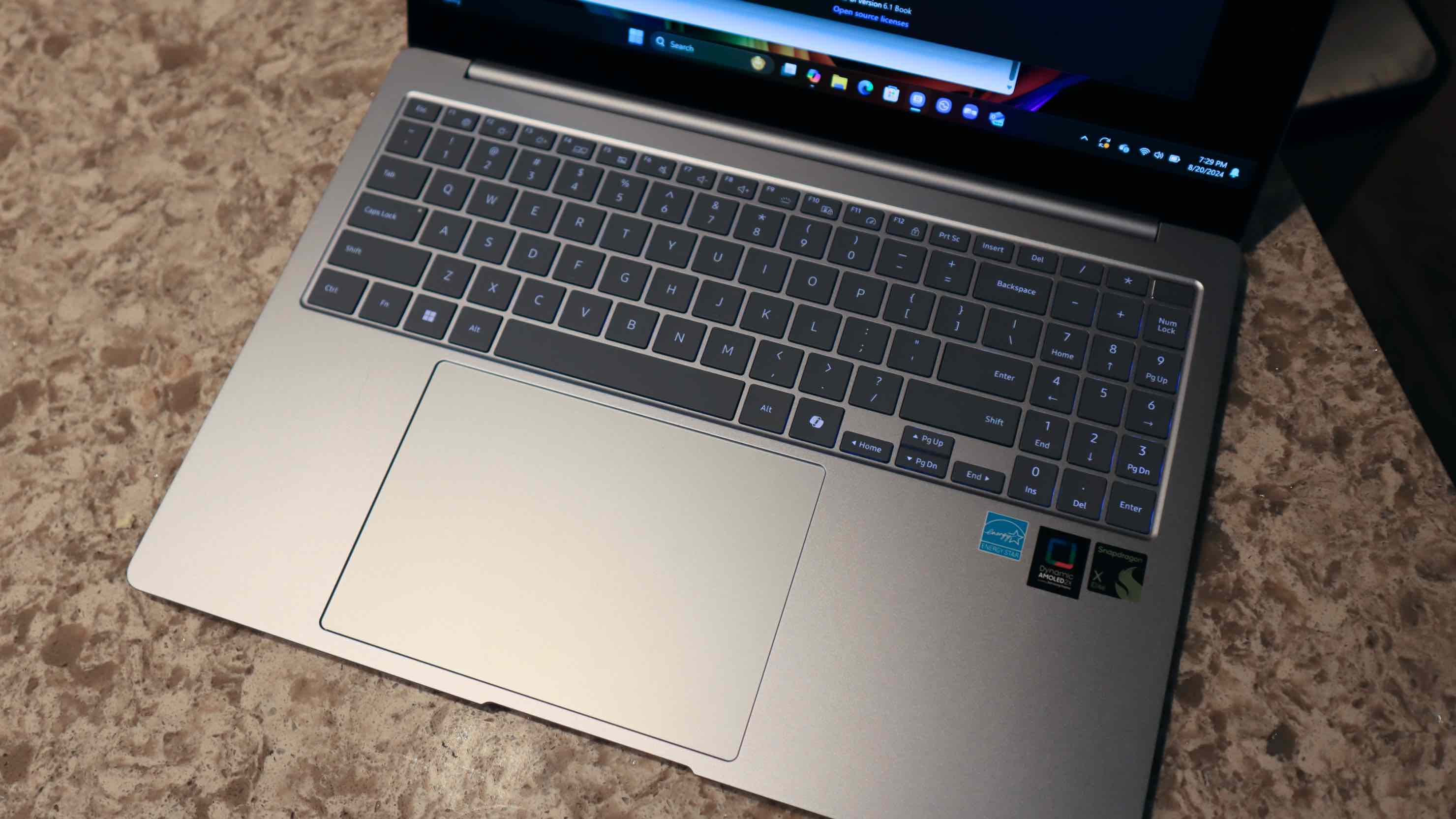
- A big, expansive display housed in an ultra-slim, lightweight build
- Plenty of ports
- AMOLED screen is immersive and super punchy with colors
With a sleek aluminum build in a shade that Samsung has coined Sapphire Blue – truthfully mostly gray and silver with a dash of blue – the Galaxy Book4 Edge looks right at home alongside its other laptops. Mirroring Microsoft’s Surface Laptop lineup or many of Apple’s best MacBooks, the Book4 Edge also comes in two sizes: 14-inch or 16-inch.
I’ve spent several weeks with the bigger 16-inch, and while it offers an immersive experience from an AMOLED display, it’s strikingly lightweight and thin. Even with that large screen, it still feels very portable, thanks to a thin, tapered frame that allows for a good mix of ports. It's 0.48 inches thick and weighs just 3.4 grams, which makes it pretty lightweight for a laptop of this caliber. Furthermore, it’s a balanced weight that makes it easy to lift with just one hand and place on your lap for working on the fly.
However, with the 16-inch display, I’d say place it on a table at home or
a tray if you're out and about on a train or plane. The display here is one of my favorite aspects; Samsung has never been a slouch. Like Apple’s Mini LED Super Retina XDR displays on MacBook Pro, this AMOLED here is vibrant and punchy with colors but also delivers crisp, inky blacks for text. Everything pops, and if you’re into watching films or content on a laptop, it flies here well. It’s pretty accurate for image editing, and the boon over a Mac and competing laptops is the touch-enabled screen.
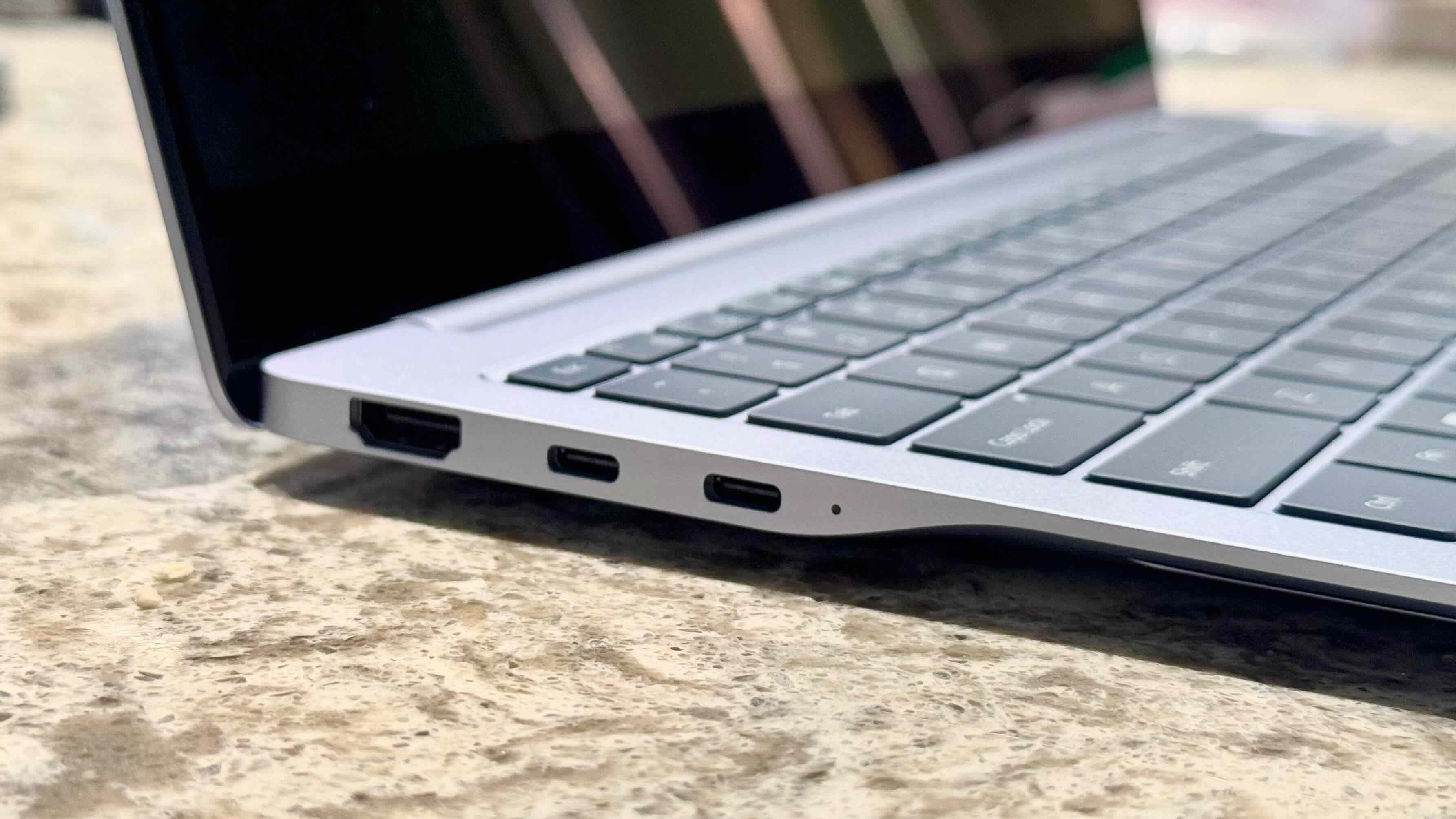
You can easily connect to an external monitor if you need more real estate, though, as Samsung didn’t skimp on any ports here. The left side has an HDMI and two USB-C ports, while the right has a micro SD card slot, headphone jack, and USB-A port. The latter is nice to see on a modern, ultra-thin laptop in 2024.
Under the display in the main hull of the Galaxy Book4 Edge is a full-size keyboard with a function row and a number pad that feels cramped on the right hand side. It seems like a last-minute addition that didn't shake out in practice. The rest of the keys are a bit more expectedly sized and comfortable enough to type on, but there is significant travel here. To that effect, the keys don’t recoil a tremendous amount.
On the other hand, the trackpad is quite spacious and easy to navigate around the 16-inch AMOLED screen. With one swipe, you can quickly move a file from the top left to the bottom right.
So yes, any 16-inch laptop will be a behemoth, but Samsung’s approach was to slim it down and cut the weight. That’s effectively done here, so while the 16-inch Galaxy Book4 Edge is large, it has a bit of grace thanks to its lightweight and ultra-slim build that reminds me of Windows Ultrabooks from yonder.
- Design: 4 / 5
Samsung Galaxy Book4 Edge: Performance
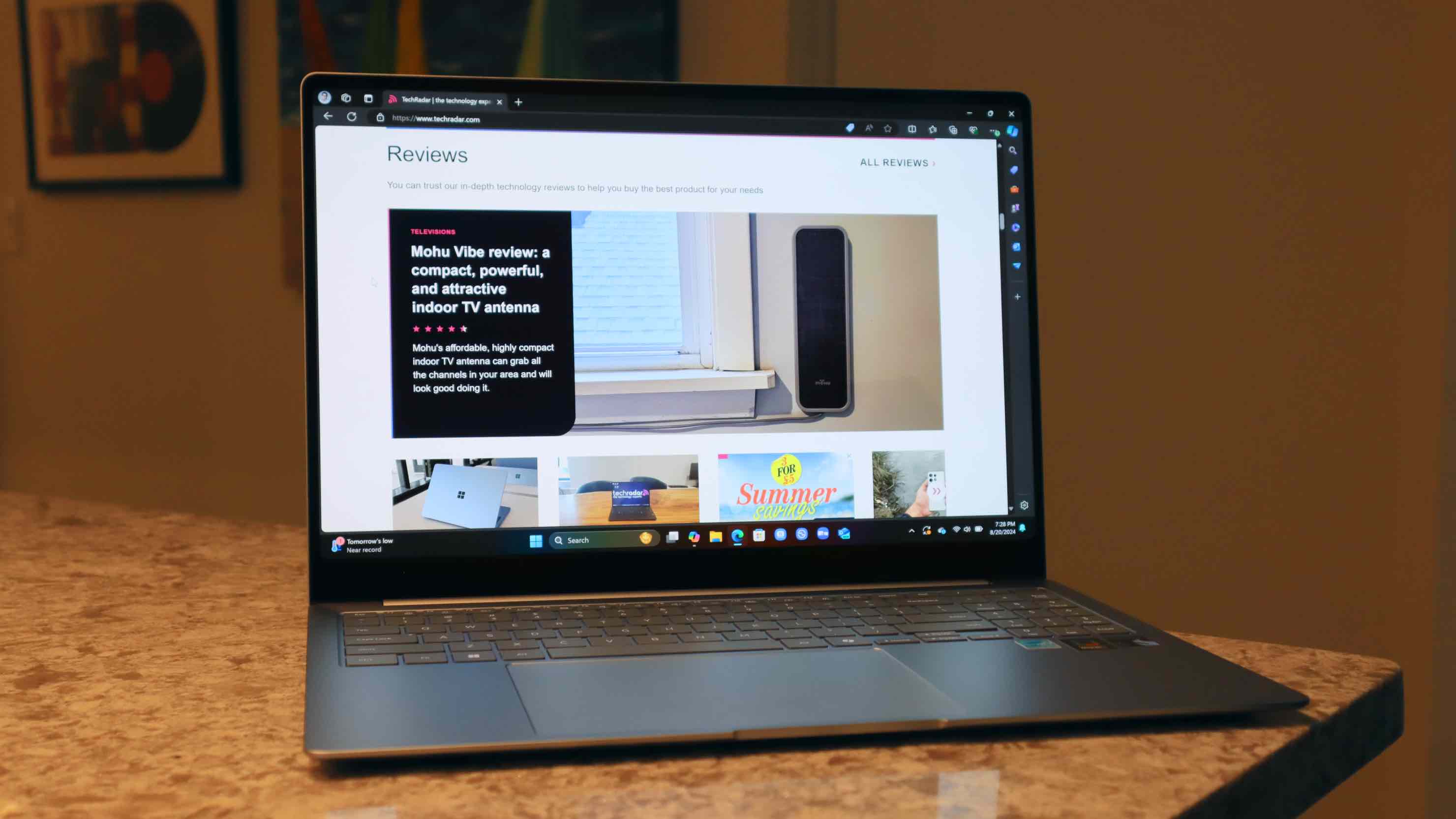
- Copilot works well here
- Deep integration with Samsung Galaxy phones and tablets for some really handy functionality
- If the app is compatible, performance will fly
Like other AI PCs – including Microsoft’s Surface Laptop 7 or Dell’s XPS 13 – the Galaxy Book4 Edge is powered by Qualcomm’s latest and greatest, the Snapdragon X Elite. In short, Windows 11 really moves here. It’s faster to wake from sleep, it can last a heck of a lot longer in multi-day standby, optimized applications open much faster, and it feels a lot more instantaneous in everyday use.
Of course, aside from general performance, the chip is also here to power some of the new AI features under the Copilot brand; there is even the dedicated key sandwiched between “ALT” and the number keys. Pressing it instantly (I’d say well under a second) brings up the Copilot app, which lets you chat with the assistant. From there, you can select a style for conversation – creative, balanced, or precise – and you’re off. Copilot was quick in my testing to provide topical answers on events, fast calculations, and even less specific ones. It will also employ “Designer” using DALL-E-3 to create images, be it a turtle underwater or a particular style of art recreation of a favorite city. Regardless of the answer, you’ll want to double-check it, though, since it’s AI and misinformation is possible.
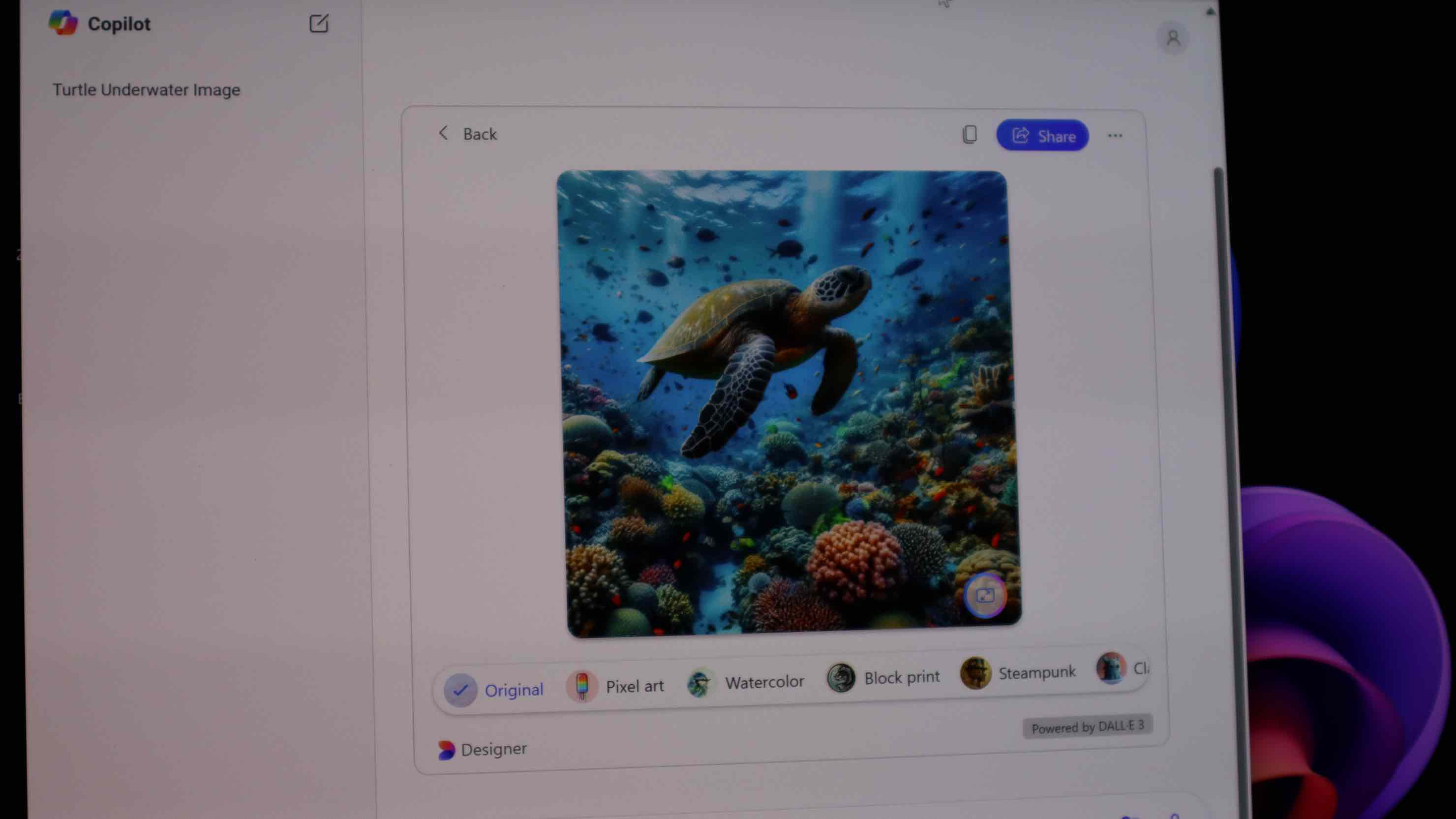
One Copilot feature that’s missing is Recall, though, as Microsoft is still working on it. With this promised feature, Windows will take screenshots and create a history of sorts. In its original form, this would have happened automatically, which caused some outcry, especially from a privacy perspective. If you’re keen to try it now, it’s available via the Windows Insider Program, but it’s still in beta and isn’t designed for everyday use. When it does roll out, you’ll be able to opt in or out of it.
Performance here is mostly in line with other Copilot laptops, namely thanks to a similar, if not the same, Snapdragon X Elite processor inside. Applications open quickly, and tasks are completed promptly, especially for optimized software. You will still encounter applications that aren’t, though, even to the degree where you might not be able to install them. The hope is that adoption will continue to grow, and that developers will roll out updates; Adobe is already working on updating its suite beyond Photoshop.
Samsung did some legwork here, though, and rolled out some really nice ecosystem features. If you have a Galaxy phone, this likely makes the Galaxy Book4 Edge the best AI PC to invest in – that can be doubled down if you have a Galaxy Tab since that can be used to extend your screen – no cables required.
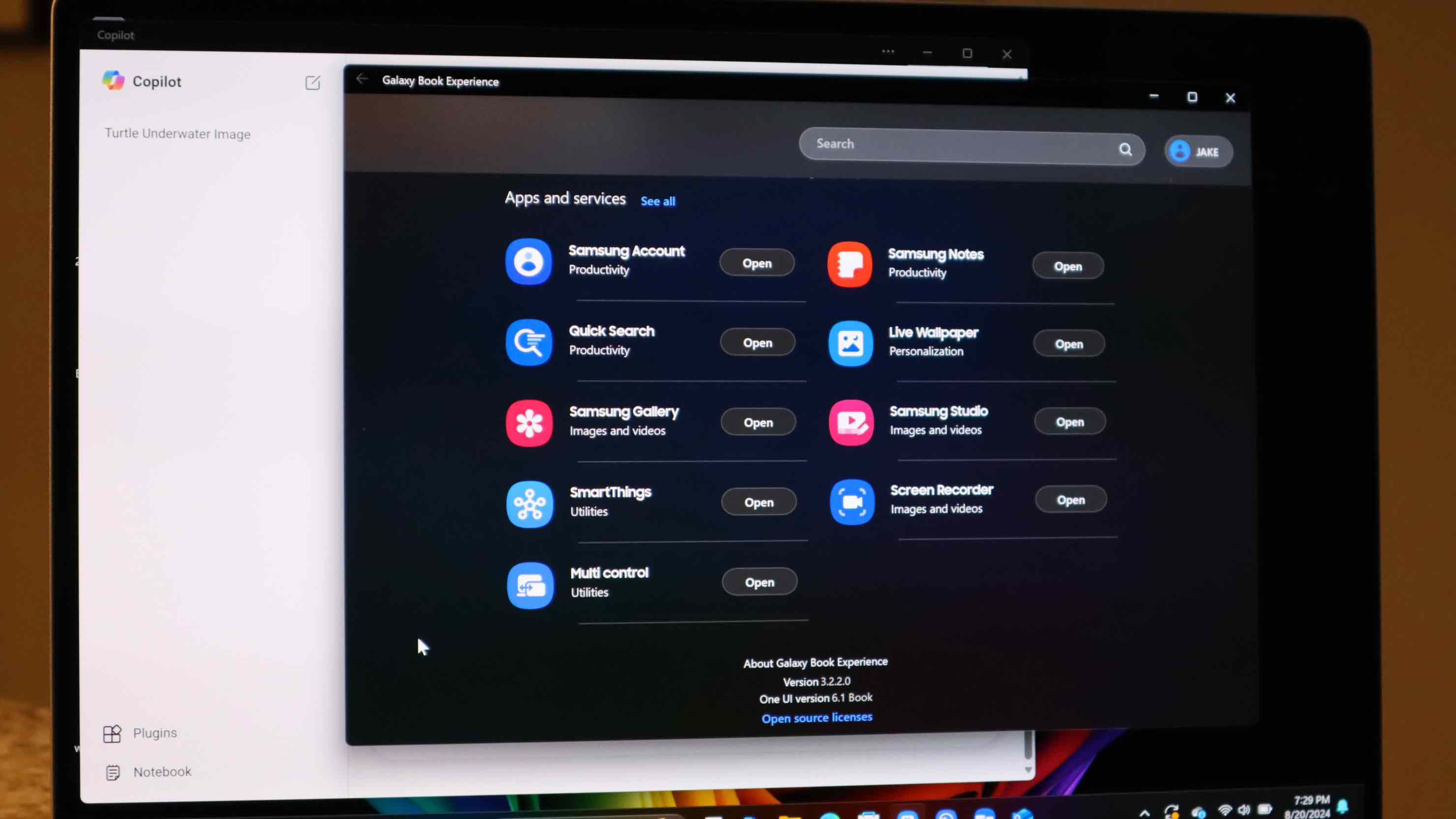
Here's how the Samsung Galaxy Book4 Edge performed in our suite of benchmark tests:
3DMark Steel Nomad: 586; Fire Strike: 6,003; Time Spy: 2,174; Wild Life Unlimited: 29,078
GeekBench 6.3: 2,935 (single-core); 15,818 (multi-core)
25GB File Copy: 24.59 seconds
HandBrake 4k to 1080p encoding: 5:00 minutes
CrossMark Overall: 1,485; Productivity: 1,411; Creativity: 1,590; Responsiveness: 1,409
Web Surfing (Battery Informant): 9:56:24
Sid Meier's Civilization VI: Gathering Storm (1080p, Ultra): 24 fps; (1080p, Low): 21 fps
These Samsung apps are built-in, but you can find them under the Galaxy Book Experience. Folks with a Galaxy Z Flip or S will be right at home with Samsung Notes, Studio, SmartThings, Quick Share, and Phone Link. This lets you seamlessly bring elements from your phone to your laptop, like texts appearing on both, using your keyboard to respond on either, and even quickly sharing files between the two devices.
It all works pretty seamlessly, but the star is being able to control your Galaxy phone on the Book4 Edge, just like the forthcoming iPhone Mirroring app for macOS Sequoia. It wasn’t without a hitch, and I did experience a crash, but when it works, it’s convenient, especially if you left your phone charging in another room.
Even with this Galaxy-specific experience running alongside other Windows apps, you’ll be hard-pressed to make this laptop slow down or get overly hot. As you’d expect from a Windows laptop with the latest Qualcomm chips, performance is fast, and that goes for productivity or creative experiences. This means that the Book4 Edge is suitable for work and play if compatible.
- Performance score: 5 / 5
Samsung Galaxy Book4 Edge: Battery
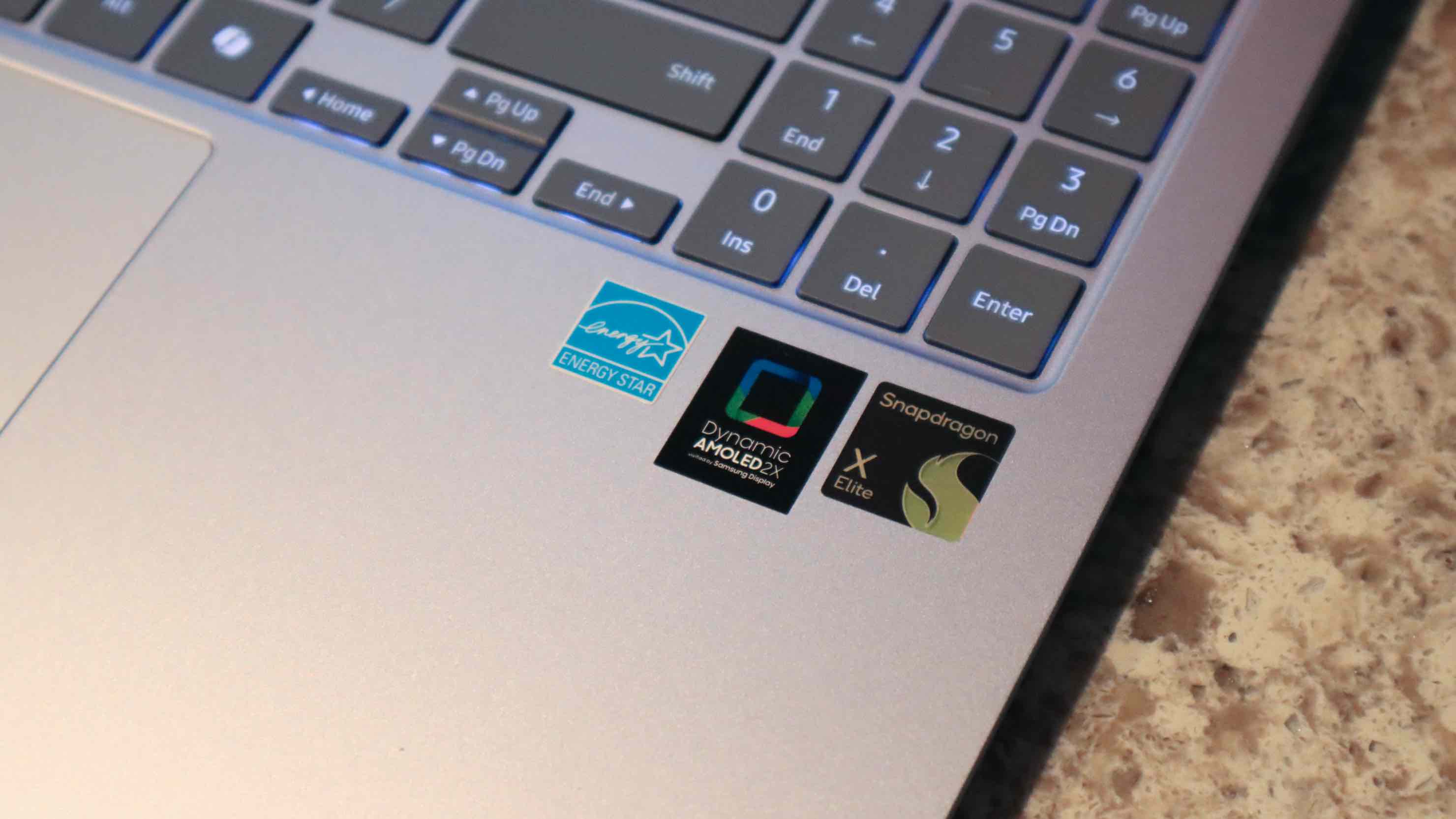
- Doesn't last as long as other Copilot laptops
Performance boosts aside, the other promised advantage of a Copilot laptop is greatly improved battery life. The Surface Laptop 7 in our review hit the mark with 15 hours in our battery test, while the Dell XPS 13 hit up to 20 hours. The latter is the best we’ve tested out of these new Windows laptops and beats out the Galaxy Book4 Edge by quite a bit.
In our standard video playback loop to test battery life, Samsung’s Galaxy Book4 Edge lasts just shy of 10 hours at 9 hours and 56 minutes. It could be the AMOLED display, the larger size, or a smaller battery cell inside, but that is not the longest battery life by any stretch of the imagination…especially at this price point.
However, in qualitative use, you can get a full workday out of it if you can top it off at some point, mainly if you’re pushing it a bit harder with specific applications, as that will drain the power faster.
One big advantage, though, as I noted above, is that it does wake up pretty instantaneously from sleep, whether that be after a few minutes, hours, or days. Gone are the days of waiting for this to reboot.
- Battery score: 3.5 / 5
Should you buy the Samsung Galaxy Book4 Edge?
Buy it if...
Don't buy it if...
Samsung Galaxy Book4 Edge: Also consider
If you're aren't sold on Samsung's Galaxy Book4 Edge, consider these three alternative laptops.
How I tested the Samsung Galaxy Book4 Edge
I've spent nearly a month using the Samsung Galaxy Book4 Edge for work with applications like Edge, Slack, AirTable, the Microsoft Office Suite, and Google Chrome, as well as for play with countless applications. TechRadar ran a set of qualitative benchmarks to gauge performance. I matched those with my everyday performance in several scenarios, including being connected to power or running off battery indoors and outdoors.
To get a feel for the design, I used it in various locations and tested traveling with it with three backpacks to get a sense of versatility. I also wrote this review and countless other stories using the integrated keyboard and viewing them back on the display. I paid close attention to the Copilot experience and others that use the NPU in the Snapdragon X Elite processor.
To get a sense of the ecosystem integration, I used the Galaxy Book4 Edge alongside a Galaxy S24 Ultra, a Galaxy Tab, and a Galaxy Z Fold 5 to test the functionality with experiences like Quick Share, working with Samsung Notes, and mirroring my phone screen to the laptop.







